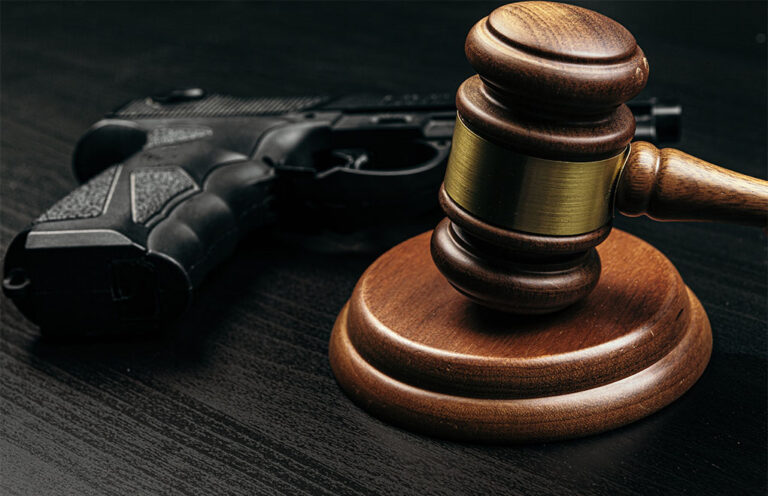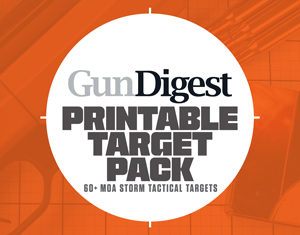
In the eyes of a jury, your choice of carry pistol could be the difference between murder and acquittal.
What you carry everyday can affect the outcome of your self-defense trial. You might even be found guilty of murder because of the carry pistol you chose.
How could that be so, you ask? The jury. The jury will be either 6 or 12 citizens from your home county, all of which have clean criminal histories, and typically middle aged or older. Occasionally, younger folks get on, but not often. And, when deciding your guilt or innocence, they’ll take into account all the facts presented at trial, including the type of gun you used.
Case in point: I worked as an expert in a Tucson, Arizona, case, where the prosecutor made a big deal about the Glock 19 pistol the defendant used, and the number of rounds it held. He did so in an attempt to sway the jury against the defendant, at one point calling him a “gun nut.” Did it work? Not really, because the trial ended with a hung jury, with the majority voting to acquit and the minority to convict.
As with many hung juries, the Pima County prosecutor decided to prosecute again. This time, I advised the defense attorney to ask each police witness what gun they carried (Glock 17s) and how many bullets were in the gun. This time, there was no mention by the prosecutor about the gun the defendant used. Interestingly, the second jury also hung, and the judge eventually dismissed the case.
Another case where the prosecutor (again in Arizona) made a big deal about the type of gun used was when a retired school teacher, Harold Fish, was hiking and forced to shoot and kill an attacker. Fish used a 10mm 1911 pistol, and during trial the prosecution made a big deal about the power of the 10mm. The jury came back with a guilty verdict.
Your Carry Pistol As Evidence
You see, when a person uses a gun in self-defense, the gun will be confiscated by the police as evidence in the shooting, and if you’re prosecuted, it’ll become a lead witness in your case. Typically, the gun will be introduced in court, waived around in front of the jury and, absent a cogent and logical argument from the defense, might just prejudice a member or two of the jury against you.
However, in most cases, skillful work by the defense can nullify or even turn the argument into a positive one for your side. Let me explain, using myself as an example, with a hypothetical cross-examination in a hypothetical court case. I personally carry a 10mm 1911 pistol for daily carry, and a line of questioning might go like this:
Prosecutor: Mr. Hayes, the 10mm pistol you used in this shooting was a powerful gun, right?
Me: Yes, it is.
Prosecutor: In fact, the FBI carried it for a little while, but it proved too powerful for their agents, right?
Me: That is what they claimed, but as I understand the issues, it was more about the gun they chose rather than the power of the 10mm cartridge.
Prosecutor: Can you explain your answer? (Note, the prosecution, by asking an open-ended question, they do not know the answer to have just sealed their fate in this issue.)
Me: They chose the large-framed Smith & Wesson 1076 pistol which, being a large-framed pistol, was simply too large for many agents to use effectively. The large frame resulted in the agents with small hands having to shoot the gun by grasping the pistol and having the backstrap of the pistol recoil against the knuckle of the thumb, instead of the web of the hand. This can be very painful and eventually cause injury to the shooter’s hand. Additionally, that particular gun was heavy, and since most agents wore suits and ties instead of a duty belt in uniform, the agents also found it difficult to conceal.
Prosecutor: I see. Well, then, isn’t this an issue for you?
Me: Absolutely not. You see, if I carried the Smith & Wesson 1076, I too would find it difficult to conceal. Instead, I carry a Nighthawk 10mm Commander, which is both lighter and smaller. It is, in fact, easy to carry.
Prosecutor: (Not knowing when to stop.) OK, Mr. Hayes, what about the extreme power of the 10mm pistol?
Me: Being a firearms instructor early in my professional career, and now as an expert witness myself, I have both heard of and seen cases where less powerful ammunition resulted in an armed citizen or law enforcement officer needing to fire several shots in order to stop their attacker. The more times a person has to shoot to stop an attacker, the more chances there are to miss and hit innocent individuals. Additionally, I have seen many cases of the person being shot twisting and turning and taking shots in the back, resulting in an indictment for an otherwise justifiable shooting.
Prosecutor: Thank you, Mr. Hayes, no further questions.
Note: I would make sure the defense counsel brought up the issue again, where I could explain more in depth about my level of expertise and the selection of the ammunition I choose to use. In a normal self-defense trial, this role would be for the expert witness the defense hired to explain these issues to the jury.
In addition to the gun and ammunition you used, there are other issues to consider. One is the name on the side of the gun and the name of the ammunition. If both these marketing decisions are implemented to tickle the imagination of the purchaser, to make them feel like a “badass,” then it’ll also perhaps persuade the jury you are a “badass.” Names like “persuader,” “ultimate kill machine,” “the assassinator,” etc. would probably work against you, not for you.
Take Law Enforcement’s Lead
So, what to choose and why? The safest gun and ammunition to choose is what your local cops choose. And since it’s a concealed carry pistol, a smaller version would be fine. As far as ammunition, avoid the boutique ammo makers and stick with the make law enforcement regularly use.
Every choice I make regarding what I use for self-defense is filtered through the eyes of my potential jury. I would recommend you do so, too.
Editor's Note: This article originally appeared in the 2022 Everyday Carry special issue of Gun Digest the Magazine.
More Knowledge For The Armed Citizen:
- Carry Law: What Is A Righteous Shooting?
- Concealed Carry and the Right to Remain Silent
- Tips For Communicating With Police After Shootings
- Concealed Carry: After the Shooting
- Q&A: Massad Ayoob On Self-Defense In Modern America

Next Step: Get your FREE Printable Target Pack
Enhance your shooting precision with our 62 MOA Targets, perfect for rifles and handguns. Crafted in collaboration with Storm Tactical for accuracy and versatility.
Subscribe to the Gun Digest email newsletter and get your downloadable target pack sent straight to your inbox. Stay updated with the latest firearms info in the industry.

![Best Concealed Carry Guns In 2025 [Field Tested] Wilson Combat EDC X9S 1](https://gundigest.com/wp-content/uploads/Wilson-Combat-EDC-X9S-1-324x160.jpg)


![Best 9mm Carbine: Affordable PCCs [Tested] Ruger Carbine Shooting](https://gundigest.com/wp-content/uploads/Ruger-Carbine-Shooting-100x70.jpg)
![Best AR-15: Top Options Available Today [Field Tested] Harrington and Richardson PSA XM177E2 feature](https://gundigest.com/wp-content/uploads/Harrington-and-Richardson-PSA-XM177E2-feature-100x70.jpg)

Assault on Wall Street, Original title: Bailout: The Age of Greed, Is movie from 2013 on the shooting of a CEO that happened to the United health care man. Jim, an average New Yorker, lives with a sick but loving wife. Suddenly, everything changes when the economy crashes and causes him to lose everything. Filled with anger and rage, Jim goes to seek revenge for the life taken from him.
Isn’t Tucson a castle law city? What were the circumstances of the use of deadly force ?
“waived around in front of the jury”
That would be waved.
I go in the same direction as “No one of consequence” and I will add that once the legitimity of self defense is established, whatever the weapon used, it remains a justifiable use of deadly force. A rifle and a shotgun are usually way more powerful than any handgun, orienting the debate towards which handgun caliber has been used should be regarded as child play and the “opponent’s” lawyer should make it very clear that it is so. I will now close by saying that the very best advice I received on the matter is “stay away from the legal system the best you can”. It can mean different things to each one but as sure as you must breath to live, rather often the legal system is not the “friend” you believe it is.
So I suppose the general takeaway is: be able to explicate why you carry what you do, and how those choices are made in the interests of safety to you and others.